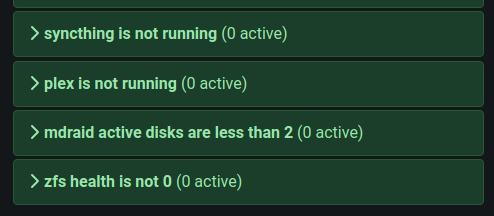Try a Scrutiny: https://github.com/AnalogJ/scrutiny#docker
Selfhosted
A place to share alternatives to popular online services that can be self-hosted without giving up privacy or locking you into a service you don't control.
Rules:
-
Be civil: we're here to support and learn from one another. Insults won't be tolerated. Flame wars are frowned upon.
-
No spam posting.
-
Posts have to be centered around self-hosting. There are other communities for discussing hardware or home computing. If it's not obvious why your post topic revolves around selfhosting, please include details to make it clear.
-
Don't duplicate the full text of your blog or github here. Just post the link for folks to click.
-
Submission headline should match the article title (don’t cherry-pick information from the title to fit your agenda).
-
No trolling.
Resources:
- awesome-selfhosted software
- awesome-sysadmin resources
- Self-Hosted Podcast from Jupiter Broadcasting
Any issues on the community? Report it using the report flag.
Questions? DM the mods!
Cheers for this, I just bought a stack of new hard drives myself and this is exactly what I didn't know I needed.
Does scrutiny recognize zfs pools?
Scrutiny uses smartctl --scan to detect devices/drives.
https://github.com/AnalogJ/scrutiny#getting-started
It will recognize the block devices but not the filesystem construct. That means ZFS pools themselves are out of scope.
If you want regular automatic hdd checks and don’t need a WebUI I recommend https://github.com/smartmontools
So just as an FYI to those who trust these sorts of things, SMART technology is a self reporting thing. The hard drive is more than capable of lying to the data in that system if it protects the manufacture from responsibility of replacing faulty drives. Whats more, it's actually pretty rare that SMART reports and issue before the drive just sorta... dies someway or another.
It's not useless technology, but it's pretty damn close. I don't even both with any of my setups. I test it by monitoring if the server has issues reading/writing. SMART wont tell me anything before that will.
Source: Was a firmware engineer on hard drives for 10 years.
SMART value monitoring helped me finding faulty drives, not only once. And drives are tested before adding to a production system.
Certainly system drives are separate from data drives. The latter can be perfectly monitored by SMART values.
Okay, but how do you monitor the issues with reading and writing?
There's an app called scrutiny that does exactly what you are looking for
I just have a shell-script running daily that runs the smartctl short test and checks certain S.M.A.R.T. values and pings healthchecks.io when successful. Easy and seems to do the job.
smartd + email to mailrise which sends notifications to a self hosted gotify instance. I then get notifications through the gotify mobile app and on the web interface.
Ingredients
- A 10-line Python script that parses the
zpool statusand looks for errors - A systemd one-shot service that runs it and puts the output into node_exporter
- A systemd timer that runs the service every 5 minutes
- A Prometheus container that among other things has an alert for changes in the zpool health data
Result

Once this is setup, it's trivial to add other checks like smartmontools, etc. If you add Alertmanager, you can get emails and other alerts sent to you while you're not looking.